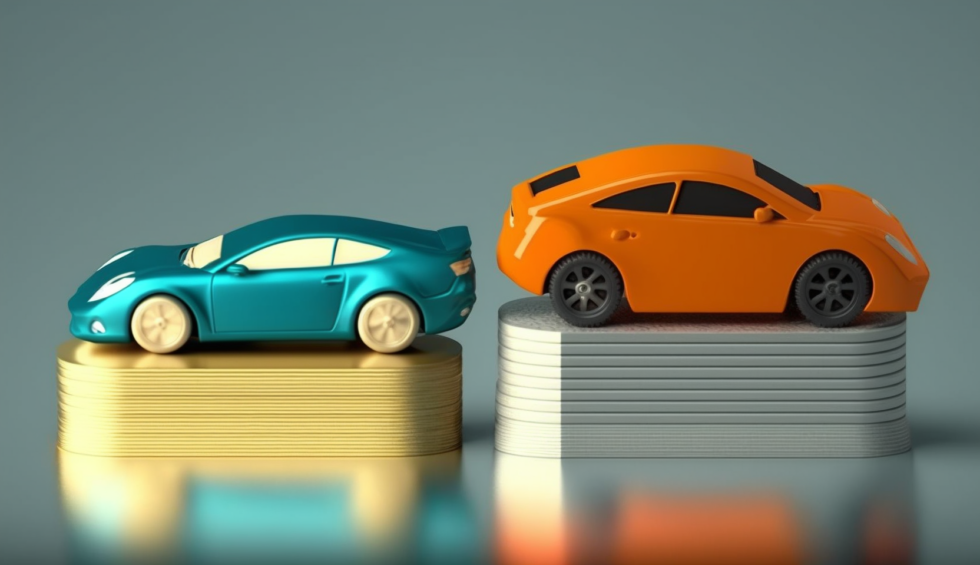Finance vs. Lease: Which is the Better Option for Car Ownership?

Are you looking to get a new car, but unsure whether to finance or lease it? It’s a common dilemma for many people, and it can be challenging to decide which option is best for you. In this article, we’ll explore the pros and cons of both financing and leasing a car and help you determine which option is the better fit for your situation.
Financing a Car
When you finance a car, you take out an auto loan, which is used to purchase the vehicle. You then pay back the loan, along with interest, over time. Financing is a popular option for those who want to own their vehicle outright.
Pros and cons of financing a car
Financing a car is a common choice for many people, but like most things in life, it has its pros and cons.
Let’s start with the pros. One of the most significant advantages of financing a car is that you eventually own the vehicle outright. At the end of the loan term, you’ll have paid off the loan, and the car will be yours to do with as you please. This gives you the flexibility to make modifications to the vehicle or sell it whenever you want.
Another benefit of financing is that you can often get a newer, more reliable car than you would be able to afford if you were paying cash upfront. This can be particularly beneficial if you need a car for work or have a long commute.
However, there are some drawbacks to financing as well. One of the most significant disadvantages is that financing typically comes with higher monthly payments than if you were to pay cash upfront. This can be a significant drawback for those on a tight budget, as it can eat into their monthly disposable income.
Another potential downside of financing is that it can lead to negative equity. Negative equity occurs when the car’s value is less than the amount owed on the loan. This can happen if the car depreciates faster than expected or if you take out a long loan term with a low down payment.
Pros:
- More affordable initial cost: Financing allows you to spread out the cost of a vehicle over time, which can make a car purchase more affordable upfront.
- Opportunity to improve your credit score: Consistently making your car payments on time can improve your credit score and help you establish a positive credit history.
- Flexibility in car selection: Financing provides you with the flexibility to choose a car that meets your needs and budget without having to save for years.
Cons:
- Interest charges: Financing a car means you’ll have to pay interest charges on top of the car’s price, which can add up over time.
- Monthly payments: Financing a car requires you to make monthly payments for several years, which can affect your budget and cash flow.
- Depreciation: A car’s value typically depreciates over time, meaning that the car you finance may be worth less than what you owe on it.
If you want to read more here tweet by @CNBC is a great resource for comparing the pros and cons of financing and leasing a car: link
Comparison with leasing option
One of the most significant advantages of financing a car is that it allows you to eventually own the vehicle. This means that once you have made all of the necessary payments, you will own the car outright. Additionally, financing often allows you to choose a car that you might not otherwise be able to afford if you were paying for it all at once.
On the other hand, financing a car can be more expensive in the long term due to interest payments. These payments can add up over time and result in you paying more for the car than if you had paid for it outright. Additionally, financing often requires a down payment, which can be a large upfront cost.
In comparison to financing, leasing a car allows you to make lower monthly payments, but you will not own the vehicle at the end of the lease term. Leasing is a good option for those who like to have a new car every few years, as you can simply return the car at the end of the lease and start a new lease on a new car. However, leasing often comes with mileage restrictions and can result in extra fees if those restrictions are exceeded.
When deciding between financing and leasing, it is important to consider your personal needs and preferences. If you are looking for a long-term vehicle solution and don’t mind paying a bit more in the long run, financing may be the better option. However, if you prefer to have a new car every few years and don’t mind mileage restrictions, leasing may be the way to go. Ultimately, the decision will come down to your personal priorities and financial situation.
| Financing | Leasing | |
| Ownership | Eventually own the vehicle | Will not own the vehicle |
| Monthly Payments | Can be higher | Can be lower |
| Down Payment | Often required | Often required |
| Interest Payments | Adds to long-term cost | Typically included in lease |
| Mileage Restrictions | None | Typically imposed |
| Extra Fees | None | May incur if restrictions exceeded |
This table can help you compare the advantages and disadvantages of both financing and leasing a car, which can help you make an informed decision based on your personal preferences and financial situation.
Tips for choosing the right financing option:
- Evaluate your credit score: Before applying for a car loan, check your credit score and review your credit history to ensure you qualify for the best rates.
- Consider the length of the loan: Longer loans may have lower monthly payments, but they can also mean paying more in interest charges over time.
- Think about the down payment: Putting a larger down payment on a car can help reduce the amount of interest you’ll pay and shorten the length of the loan.
- Shop around: Don’t settle for the first financing option you come across. Shop around and compare rates from different lenders to find the best deal.
- Read the fine print: Before signing any loan agreement, read the terms and conditions carefully to ensure you understand the interest rate, payment schedule, and any other fees associated with the loan.
When deciding between financing and leasing, it’s essential to consider individual priorities, driving habits, and financial situation. Some people prioritize ownership and long-term savings, while others prefer affordability and frequent upgrades. Consider how much you drive, your budget, and your future plans for the car when making this decision.
Read more with @USATODAY’s Twitter post which breaks down the differences between leasing and financing a car: link
Leasing a Car
Leasing a car involves renting it for a set period, typically three to four years, and paying a monthly fee. At the end of the lease term, you return the car to the dealer.
Pros and cons of leasing a car
One significant advantage of leasing a car is the lower monthly payments compared to financing. Leasing also allows you to drive a new car every few years, which can be an attractive option for those who like to keep up with the latest models. However, you don’t own the vehicle at the end of the lease, and there are mileage and wear-and-tear restrictions that you must follow. Additionally, there can be fees at the end of the lease, such as excess mileage or damage charges.
Tips for choosing the right leasing option
When choosing the right leasing option, consider the lease term, mileage limit, down payment, and monthly payments. You should also evaluate your driving habits and overall financial situation.
Examples of Choosing Between Financing and Leasing
To better understand when financing or leasing might be the better option, let’s explore some real-life scenarios.
Scenario 1: Long-term ownership and cost savings are the priority
If you’re looking for long-term ownership and cost savings, financing may be the better option. For example, let’s say you plan to keep the car for several years and drive it regularly. By financing the car, you’ll eventually own it outright and won’t have to worry about monthly payments anymore. Plus, you’ll have the potential for long-term savings if you take good care of the car and avoid costly repairs.
If this scenario matches yours, you can learn more with @ConsumerReports’s useful article that compares the costs of financing and leasing a car over a five-year period: link
Scenario 2: Short-term affordability and frequent upgrades are the priority
If you prioritize short-term affordability and frequent upgrades, leasing might be the better option. For example, let’s say you prefer to drive a new car every few years and don’t want to commit to ownership. By leasing, you’ll have lower monthly payments and can easily trade in for a new car at the end of the lease term. This can be a good option if you don’t drive many miles and want to avoid costly repairs.
Scenario 3: High mileage and wear-and-tear are expected
If you expect to drive high mileage and put significant wear-and-tear on the car, leasing might not be the best option. Many lease agreements come with mileage restrictions and fees for excessive wear-and-tear, which can add up quickly. In this case, financing may be a better option as you won’t have to worry about these restrictions or fees.
Discussion of the various factors that influenced the decision
FAQ
Car financing is a loan that allows you to buy a car and pay for it over time with interest. You make monthly payments until the loan is paid off, and the car becomes yours.
Car leasing is a contract that allows you to use a car for a set period, usually 2-3 years, and make monthly payments. At the end of the lease, you return the car to the dealer.
Financing allows you to build equity in your car, and once the loan is paid off, you own the car outright. You also have the freedom to modify the car as you wish, and there are no mileage limits.
Financing typically requires a higher down payment and higher monthly payments than leasing. You also need to maintain the car to keep its resale value, and it may depreciate faster than the loan is paid off.
Leasing typically has lower monthly payments and requires a smaller down payment. You can drive a new car every few years, and the car is covered under warranty for the duration of the lease.
Leasing does not build equity in the car, and you must return the car at the end of the lease. You also cannot modify the car or exceed mileage limits without incurring additional fees.


